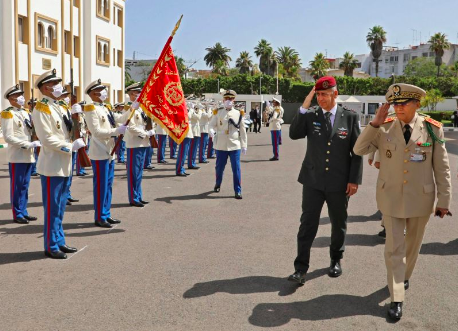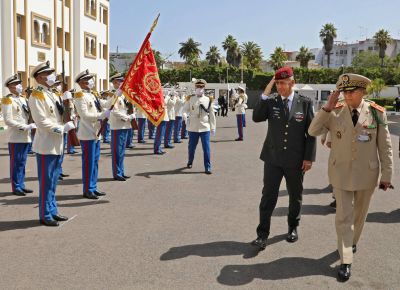
Lieutenant-General Belkheir al-Farouq, Inspector General of the Royal Moroccan Forces (R.) and the head of the Israeli army, Aviv Kochavi, in Rabat, July 19, 2022. (Credit: AFP/HO/RAF)
As Israeli army chief Aviv Kochavi landed Monday in Morocco for an unprecedented three-day visit, a handful of demonstrators gathered in the streets of the capital, opposite their Parliament, to protest against the normalization of ties between Rabat and Tel Aviv.
Organized at the initiative of the Moroccan Front in Support of Palestine and the Fight against Normalization, the rally aimed to reaffirm commitment to the Palestinian cause on the sidelines of official meetings.
“Palestine is a responsibility, normalization is a betrayal,” one of the protesters’ signs read.
In December 2020, Morocco became the sixth Arab country to normalize relations with Israel following in the footsteps of Egypt (1979), Jordan (1994), the United Arab Emirates (2020), Bahrain (2020) and Sudan (2020).
However, more than a year-and-a-half after the formalization of relations between Morocco and Israel, we still are far away from a massive outrage that dominated the kingdom until recently.
In 2018, more than 10,000 Moroccans demonstrated against the transfer of the American embassy in Israel from Tel Aviv to Jerusalem.
The Abraham Accords in 2020 generated the same reaction.
Presented by Washington as a historic peace initiative between Israel and several Arab countries, the deal was denounced as the “theft of the century,” while a draft law was previously introduced to criminalize “normalization” with Israel.
This opposition has become almost marginal, or at least much less vocal.
“This shows how well the monarchy and the [Moroccan] government have managed to sell this normalization project and convince the population that this new relationship is in the country’s interest,” Intissar Fakir, director of the North Africa and Sahel program at the Middle East Institute, told L’Orient-Le Jour.
Since relations were formalized, rapprochement between the two sides has continued at a steady pace on the military and strategic fronts, as well as on the commercial and tourism levels, including launching direct flights between the two countries in early December 2021, and the announcement in June of a bilateral agreement to promote the entry of Moroccan workers to Israel.
“Never before have relations between Israel and an Arab state reached such a level in record time — not only in the frequency of exchanges and visits, but also in the nature and depth of relations,” Hasni Abidi, director of the Center for Studies and Research on the Arab and Mediterranean World (CERMAM), told L’Orient-Le Jour.
In order to narrativize this rapprochement, the kingdom continues to exploit the country’s Jewish-Moroccan heritage to frame the normalization process within the context of older ties.
Last week, King Mohammad VI announced measures to reorganize the institutions of the Moroccan Jewish community, while reaffirming “the Hebrew tributary as a component of Moroccan culture.”
On the eve of the creation of Israel, the Jewish community numbered 250,000 in Morocco, making the kingdom a special case in the Arab world.
Despite a massive exodus, the Jewish community in Morocco, currently estimated at 3,000, is the largest in North Africa — while some 700,000 Israelis are of Moroccan origin.
“Normalization on all levels”
This week’s visit — the first by an Israeli chief of staff to the kingdom — comes in the context of furthering cooperation at the military level between the two countries.
In November 2021, the two sides signed a defense agreement, hailed as “unprecedented” at the time, aimed at facilitating exchanges in technology, intelligence and industry.
This was followed by the signing of another cooperation agreement in March, which included the creation of a joint military commission.
In late June, Israeli observers participated for the first time in “African Lion 2022,” the largest military exercise on the African continent, co-organized by Morocco and the United States.
This dynamism marks “a mutual willingness to move forward and implement, in a practical way, the November agreement,” Fakir said.
The meetings over the past few days reflect a new level of affinity between the two sides.
“Receiving Aviv Kochavi during the pre-election period in Israel is not insignificant: it shows the institutionalization of relations and the extent of a normalization at all levels,” Abidi said.
Kochavi met with senior Moroccan officials, including Defense Minister Abdellatif Loudiyi, army commander Lt. Gen. Belkbhir El-Farouk, and head of military intelligence Brahim Hassani.
The visit, which comes on the heels of US President Joe Biden’s regional tour of the Middle East, also underscores the kingdom’s geopolitical ambition, which intends to secure its place in the emerging alliance made up of Washington’s local allies — Israel, the United Arab Emirates, Bahrain and Egypt.
In March, Morocco participated in the Negev summit, a regional meeting of foreign ministers aimed at consolidating an alliance in the face of Iran.
“This is an important image for Morocco as it positioned itself as a new emerging force within this new regional security structure," Fakir said.
For Rabat, however, the main issue is playing out at the local level.
The historical rivalry between the kingdom and its neighbor Algeria, notably the question of Western Sahara, represent “the structuring elements of its foreign policy,” according to Abidi.
In return for the decision to normalize relations with Israel and bring them out into the open, Washington recognized Rabat’s control over the disputed area in December 2020.
The desert area, controlled mainly by Morocco, is still considered by the UN as a “non-self-governing territory.”
American support offered a decisive advantage in the conflict opposing the kingdom to the Polisario Front independence fighters, supported by Algiers since 1975.
The latter, which broke off diplomatic relations with Rabat in August, “is forced to seek new alliances in a frantic arms race between the two states,” according to Abidi.
Despite the vitality of the emerging relations between Morocco and Israel, almost everything remains to be built.
In particular, it is too early to anticipate the financial, tourism or commercial impact of the new partnership on the national economy.
Relations also remain dependent on external factors that could at any time reverse the trend or simply slow its pace.
“In the event of a Palestinian uprising or if the US administration reverses its proposal to legitimize Moroccan sovereignty over the Sahara, these relations may be halted, minimized, or axed at any moment,” according to Abderrahim Chalfaouat, a researcher specializing in Moroccan-American relations at Hassan II University in Casablanca.
This article was originally published in French in L'Orient-Le Jour. Translation by Sahar Ghoussoub.
